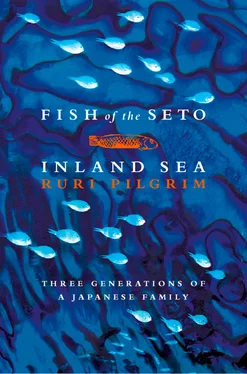âBut ...â
âI have already decided on his wife.â
âYou have?â
âYes, I have. The daughter of the Shirais in the next village.â
His wife was nonplussed.
âYou mean Dr Shiraiâs daughter?â
âYes, Dr Shirai of Kitani village.â His tone told her that his mind was made up and that his decision was final.
âThey have four sons.â She looked him straight in the eyes, which she normally did not dare to do. She was not satisfied with her husbandâs decision, because the Shirais were the poorest among all the candidates so far.
âAnd all intelligent,â Shobei replied. âThe father is a fine fellow and still young. The whole family will be a great support for Shintaro and for his future son.â
âBut the girl is very young. One of the sons is still a baby.â
âI know. That is why I had to wait. She has a very good reputation. Besides, she should know how a doctorâs household should be run, although Shintaroâs life is a bit different from her fatherâs.â Shobei sounded smug. He had already found out a lot about Dr Shiraiâs daughter, Ayako.
âIf you say so,â his wife conceded.
âOf course!â
When people heard that the daughter of the Shirais was chosen as Shintaroâs bride, they could not understand why. The Shirais had been doctors in traditional medicine for many generations. They had been the retained doctors of feudal lords until the system was abolished towards the end of the 1880s. Since then, the present head of the family, Tei-ichi, continued to look after people in the area with his hereditary knowledge and experience. He was endowed with a progressive spirit and had already contacted Shintaro to seek advice on some of his patients. Tei-ichi was respected and popular, but the family was not well-off.
Tei-ichiâs house was always full of poor patients. With backs and knees bent from hard lives, peasants brought their children who were exhausted from suffering.
Dr Tei-ichi Shirai would shout angrily, âWhy did you leave the sick child so long without bringing her to me?â
âI am very sorry ... We have not paid you the last fees and ...â
âWho is talking about fees? Donât you see this child is ill because of your neglect?â
They loved to be scolded by Dr Tei-ichi.
As many of his patients were poor, his fees were often not paid or were paid with small amounts of fish, fruit and vegetables. On the other hand, the merchants who dealt with the doctorâs family sent their accounts twice a year, but were not too harsh in demanding payment. Shobei knew it all.
The Shirais lived in an old house surrounded by a moat and high stone walls. A wooden bridge led to a large gate and straight ahead was an open main entrance. The gate was usually closed and people used a small side door to get into the front courtyard. From the courtyard they walked round the back of the house to go in through the family entrance or the kitchen.
Tei-ichiâs wife Kei was open-hearted and cheerful.
âNow, what is wrong with you this time?â she would ask a villager who appeared and stood timidly at the kitchen door. âCome in, come in. You wonât get better standing outside.â
And they would tell her their symptoms, worries and difficulties.
âIt sounds exactly like what Yohei had the other day. He is fine now. Go in and see the doctor. Only, donât mention your own opinions and everything the others have said. You wonât die yet.â
Kei had beautiful skin. She washed her face thoroughly every morning with rice bran in a small cotton bag and consulted a thermometer to choose what to wear for the day. The thermometer had been given to Tei-ichi as a thank-you present when he attended one of his well-off patients and it was the only thermometer in the surrounding villages. Schoolteachers occasionally brought pupils to see it. Kei did not use make-up, but her hair was always fashionably done up and she carried a parasol in summer to protect her face from the sun. The villagers called her âokkasamaâ, which means mother, and greeted her warmly as her neat figure hurried down the village street followed by a maid.
She would buy damaged material and sale goods at a cloth shop. She was clever at cutting and sewing kimonos and clad the whole family handsomely. All her household were well mannered and disciplined. Shobei knew this as well.
Kei also made ointment to sell. It was a simple mixture of beeswax and a few other ingredients. Although the recipe was not secret, her special skill was needed in heating and kneading. The finished product was put in sealed sea shells and was sold widely as Shirai Ointment for cuts and bruises. Kei carefully saved from the income for their sonsâ education. She was determined that her sons should go to the Imperial University like Dr Shintaro and succeed their father as modern doctors. But she did not have much ambition for her daughter, Ayako. She should marry one day but not into the kind of family that would involve the Shirais in spending a lot of money for a trousseau. Kei hoped that Ayako would be treated kindly by her husbandâs family when she married and would be sufficiently provided for. Ayako was a pretty girl so this did not seem like too much to ask for.
âBeing a doctor, he must have a secret recipe for making his daughter so lovely,â the villagers remarked when they saw Ayako.
She was nicknamed âDrop off a bridgeâ. This strange name came from a story about a man from another village who was crossing a narrow bridge when he saw Ayako coming towards him. Gawping at her, because she was so beautiful, he missed his step and fell into the river.
* * *
When a distant relative brought the marriage proposal from the Miwas, Tei-ichi was surprised. Until then, he had not thought of Ayako as a woman. Wasnât she running around with her brothers and catching fish in the river? The last time he saw her up a tree, he had vaguely wondered if it was time he should tell her off for behaving like a boy. Wasnât it only a few years ago? Besides, he had never considered the possibility of his daughter being asked for by the most sought-after bachelor he knew.
âLet me think about it,â he said eventually to the go-between. At first he could not believe what he had heard. Then he reconsidered.
âWhy, we are not such a bad family. We have nothing to be ashamed of. And Ayako is an intelligent and beautiful girl.â
But he had not expected to part with her so soon. Ayako seemed totally unprepared for the role of a young wife in such an august family. However, if he missed the opportunity to marry her to Shintaro, he was convinced that he would never find as good a match as this most accomplished young man. Tei-ichi also wanted very much to become the father-in-law of such a well-educated doctor. He would be a fine example for his sons. Undecided, he called Ayako. She was not at all demure. She looked her father straight in the eye and said, âDr Miwa, otohsan? Oh, yes, I will marry him.â
âW-wait a minute. You donât have to rush. Think about it carefully,â he stuttered, confused. âIn any case, you donât know him. I ... I am not telling you that you have to marry him.â He had expected her to be either shy and hesitant, or look totally innocent.
âI have heard a lot about him,â she said, âand I have seen him.â
âWhat?â
Tei-ichi felt that his stern control of the household was crumbling in front of him.
âWhen did you see him?â
âI went to the station with Yasuharu san to see what Dr Miwa looks like, when he came back from Tokyo.â
Читать дальше












